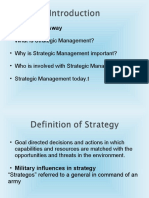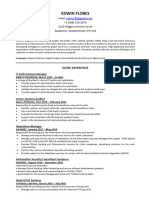BE Unit 1
BE Unit 1
Uploaded by
Aarti PandeyCopyright:
Available Formats
BE Unit 1
BE Unit 1
Uploaded by
Aarti PandeyOriginal Title
Copyright
Available Formats
Share this document
Did you find this document useful?
Is this content inappropriate?
Copyright:
Available Formats
BE Unit 1
BE Unit 1
Uploaded by
Aarti PandeyCopyright:
Available Formats
BUSINESS ENVIRONMENT UNIT 1
Meaning of Business Environment Consist of all those factors that have a bearing on the business. Environment refer to all external forces which have a bearing on the functioning of business The survival and success of a business firm depends on its innate strength resources at its command, including physical resources, financial resources, human resources, skill & organization & its adaptability to the environment and the extent to which the environment is favorable to the development of the org. The survival and success of a firm, thus, depends on two sets of factors viz the internal factors the internal environment and the external factors the external environment
Internal Environment
Business Decision
External Environment
Characteristics of Contemporary Business
Transition
Competition
Information
Business
Opportunities
Technology
Globalization
Business Objectives
Business Decisions
Business Internal Factors
Business External Factors
Nature of Business Environment Direct relationship with the policy of business enterprise Impose several constraints on the enterprise income, supply and demand, price of products, fashion taste and preference, habit, season, government policies, rules and regulation, competitors strategy. The success of an enterprise depends to a very large extent on its adaptability to the environment. Shape opportunities and possess threats to the company. It changes frequently and affect the business of any organization
Significance of BE
To develop its broad strategies and long term policies
To analyze its competitors strategies and thereby formulate effective counter strategies.
To keep organization dynamic in approach.
To for see the impact of the socio economic changes at the national and international level on its stability.
To make the executives to adjust to the prevailing conditions and thus influence the environment in order to make it congenial to the business. Development of action plans to deal with technological advancements.
Scope and its relevance to Business Decision Making
To understand current and potential changes taking place in the task environment Provide inputs for strategic decision making. Facilitate and foster strategic thinking in organization
Challenging the current wisdom by bringing fresh view points into the organization.
The interaction Matrix of different environmental factors Micro Environment Customers Public Competitors Suppliers Marketing Intermediaries
Macro Environment Economic Environment Political Environment Socio Cultural Environment Natural Environment Global Environment Technological Environment
Environmental Analysis It is tracing of an opportunity or threat to its source. It involves breaking a whole into its parts to find its nature, function and relationship EA and diagnosis give strategists time to anticipate opportunities and to plan to take optional responses to these opportunities. It also helps strategists to develop an early warning system to prevent threats or to develop strategies which can turn a threat to the firms advantage.
Need for EA Due to constant change in environmental factors To cope up with recent changes in relation to production of goods and services. Opportunities and Threats Provide necessary and very useful picture of the important factors which influence the business Technological Forecasting Contribution in identification of risk Formulation of right strategies Modification in strategies Managers informed alert and often dynamic
Limitation of EA
Fails to for see future accurately Does not guarantee organizational effectiveness Potential of EA is often not realized because of how it is practiced Too much reliance on analysis makes a manager become complacent
Process of Environmental Scanning Environmental Analysis
Strategy Formulation
Strategy Implementation
Further Analysis for change evaluation and control
Process of Environmental Analysis Scanning Monitoring Forecasting Assessment
Basic Philosophies of Capitalism and Socialism Capitalism Stress the basic concept and philosophy of individualism believing in private ownership. Socialism - Here the tools of production are to be organized, managed and owned by the government with the benefits accruing to the public
You might also like
- CHAPTER 3: The Task and Macro Environments of ManagementDocument21 pagesCHAPTER 3: The Task and Macro Environments of ManagementEunice Valeroso100% (1)
- BBA-302 Business Policy & Strategy (I. P.University)Document39 pagesBBA-302 Business Policy & Strategy (I. P.University)Dipesh TekchandaniNo ratings yet
- Expedia Payment PDFDocument1 pageExpedia Payment PDFJohan WiebeNo ratings yet
- Checklist of Documentation For IATF 16949 - 2016Document11 pagesChecklist of Documentation For IATF 16949 - 2016Deepak kumar100% (2)
- Ebe Unit 1Document48 pagesEbe Unit 1ARJUNA.RNo ratings yet
- Strategic Management 2Document97 pagesStrategic Management 2swoyamray2213No ratings yet
- SM Unit 2Document85 pagesSM Unit 2Ashhar RashidNo ratings yet
- Group 2 - Organizational Environments & CulturesDocument32 pagesGroup 2 - Organizational Environments & CulturesYae'kult VIpincepe QuilabNo ratings yet
- Unit 2Document94 pagesUnit 2Riya jainNo ratings yet
- Strategic Management NotesDocument17 pagesStrategic Management Notesvk0866114No ratings yet
- Business Environmental & AnalysisDocument51 pagesBusiness Environmental & AnalysisShreya DikshitNo ratings yet
- Basic Concepts of Strategic MGTDocument13 pagesBasic Concepts of Strategic MGTzarihriego6No ratings yet
- Business EnvironmentDocument71 pagesBusiness Environmentalexsin2112002No ratings yet
- SM 2Document81 pagesSM 2tushargupta991782No ratings yet
- Strategic Management PPT by Akshaya KumarDocument23 pagesStrategic Management PPT by Akshaya KumarAkshaya KumarNo ratings yet
- Strategy Management - LessonsDocument34 pagesStrategy Management - LessonsMaureen LobinNo ratings yet
- Environmental Appraisal: 2 Year MBA Group 3Document37 pagesEnvironmental Appraisal: 2 Year MBA Group 3Megha ThackerNo ratings yet
- Money Market in IndiaDocument39 pagesMoney Market in IndiaYash KumarNo ratings yet
- Environmental ScanningDocument20 pagesEnvironmental ScanningNeelabh MishraNo ratings yet
- Intorduction To MM Module 01 MmU2 - 1Document26 pagesIntorduction To MM Module 01 MmU2 - 1Harsh PatelNo ratings yet
- Environmental Scanning PPT'sDocument20 pagesEnvironmental Scanning PPT'sSurbhi Aggarwal75% (4)
- 1 - Business - Environment With ScanningDocument71 pages1 - Business - Environment With ScanningNavneet Nanda0% (1)
- Module 1PPTDocument16 pagesModule 1PPTarpitagupta310859314No ratings yet
- Module 2 Business & EntrepreneurshipDocument47 pagesModule 2 Business & Entrepreneurshipmaahini2005No ratings yet
- BusinesEnvironmentandLaw3&4-12-13 03 2022Document25 pagesBusinesEnvironmentandLaw3&4-12-13 03 2022siddarthaetyalaNo ratings yet
- POM 003 Org Envrmt N CultureDocument30 pagesPOM 003 Org Envrmt N CultureRajesh SinghNo ratings yet
- (Bea) 1Document28 pages(Bea) 1Rafika Hamidah HamdiNo ratings yet
- Unit 1 Strategic ManagementDocument43 pagesUnit 1 Strategic ManagementSababegumNo ratings yet
- Business Environment For MBA.Document18 pagesBusiness Environment For MBA.keneyenanalioNo ratings yet
- Daft Chapter 3Document30 pagesDaft Chapter 3Ricky ThaungNo ratings yet
- Ch-Ii BPSMDocument31 pagesCh-Ii BPSMsadamhusen2551No ratings yet
- Strategic 2Document28 pagesStrategic 2Dianne VergaraNo ratings yet
- Environmental ScanningDocument18 pagesEnvironmental ScanningShivangi DhamijaNo ratings yet
- An Introduction To Strategy NewDocument83 pagesAn Introduction To Strategy Newsehaj01No ratings yet
- Unit 1st EEBDocument8 pagesUnit 1st EEBsiddharth.j2023bNo ratings yet
- External Environment AnalysisDocument21 pagesExternal Environment Analysisdivya aryaNo ratings yet
- Week1 2c Bpestel AnalysisDocument26 pagesWeek1 2c Bpestel AnalysisKyle Vladymir AyopNo ratings yet
- Chapter 6 EditedDocument45 pagesChapter 6 EditedSihle VundisaNo ratings yet
- Antim Prahar 2024 Strategic ManagementDocument46 pagesAntim Prahar 2024 Strategic ManagementAbhay GuptaNo ratings yet
- Module 2 MMDocument38 pagesModule 2 MMwordsawwNo ratings yet
- Unit I: Concept of Business EnvironmentDocument34 pagesUnit I: Concept of Business EnvironmentMegh Nath RegmiNo ratings yet
- Business EnvironmentDocument44 pagesBusiness Environmentsshiva8812100% (14)
- Strategic Management: Strategy ImplementationDocument86 pagesStrategic Management: Strategy ImplementationBryan Joseph JumawidNo ratings yet
- Be 1 2024Document47 pagesBe 1 2024chetanaNo ratings yet
- CH 3 - SMDocument47 pagesCH 3 - SMElias HaileNo ratings yet
- Strategic Intent and Environmental AppraisalDocument31 pagesStrategic Intent and Environmental AppraisalAshika MehtaNo ratings yet
- Economic PresentationDocument25 pagesEconomic PresentationARJUNA.RNo ratings yet
- MGT 1011-3rd ChapterDocument34 pagesMGT 1011-3rd ChapterThilinaNo ratings yet
- The General Environment: Strategic ManagementDocument20 pagesThe General Environment: Strategic Managementsonal jainNo ratings yet
- Business EnvironmentDocument29 pagesBusiness EnvironmentRahul Paliya100% (1)
- Functional Policies 2Document11 pagesFunctional Policies 2Shivam SharmaNo ratings yet
- An Overview of Business Environment: by Nikunj Nayak Ganpat UniversityDocument28 pagesAn Overview of Business Environment: by Nikunj Nayak Ganpat UniversitypatelkkNo ratings yet
- Business EnvironmentDocument25 pagesBusiness Environmenthasb97No ratings yet
- Global Trends and Issues Impact of Business Strategy To Business and Industry by OM3PDocument26 pagesGlobal Trends and Issues Impact of Business Strategy To Business and Industry by OM3POdree Merl Marie PadiosNo ratings yet
- MM Mod 2Document5 pagesMM Mod 2Rahul AgarwalNo ratings yet
- Week 14 - REVISION FOR TEST 2 - Unit 2 - 2.2 Evaluating The External Enviornment - Lecture SlidesDocument35 pagesWeek 14 - REVISION FOR TEST 2 - Unit 2 - 2.2 Evaluating The External Enviornment - Lecture SlidesNguyen Châu AnhNo ratings yet
- Environmental AnalysisDocument48 pagesEnvironmental AnalysisYash KumarNo ratings yet
- Bba BPSDocument21 pagesBba BPSNatural Mogli0% (1)
- Chapter 6Document19 pagesChapter 6Madhav AroraNo ratings yet
- Slides Chapter 2 - Business EnvironmentDocument49 pagesSlides Chapter 2 - Business Environmentjackie richardsonNo ratings yet
- Lesson IV. Analyzing The External Environment of The Firm & Lesson V Assessing The Internal Environment of The Firm 4252022 2Document68 pagesLesson IV. Analyzing The External Environment of The Firm & Lesson V Assessing The Internal Environment of The Firm 4252022 2Neekah JoyNo ratings yet
- How to Enhance Productivity Under Cost Control, Quality Control as Well as Time, in a Private or Public OrganizationFrom EverandHow to Enhance Productivity Under Cost Control, Quality Control as Well as Time, in a Private or Public OrganizationNo ratings yet
- (Istvan Meszaros) Socialism or BarbarismDocument64 pages(Istvan Meszaros) Socialism or BarbarismPat Koder100% (1)
- Snapshot - Seaweed Farming in The PhilippinesDocument10 pagesSnapshot - Seaweed Farming in The PhilippinesAlex Cooper PronoveNo ratings yet
- Gap Analysis Model AssignmentDocument10 pagesGap Analysis Model Assignmentsamia suktaNo ratings yet
- Wedding BudgetDocument3 pagesWedding Budgetapi-355718164No ratings yet
- Lock Box File2Document5 pagesLock Box File2SATYANARAYANA MOTAMARRINo ratings yet
- Chapter Twelve: Power, Politics, and EmpowermentDocument23 pagesChapter Twelve: Power, Politics, and EmpowermentAmy SyahidaNo ratings yet
- Latest 1Z0-819 Exam Questions and Verified AnswersDocument2 pagesLatest 1Z0-819 Exam Questions and Verified AnswersjohnjackmicheleNo ratings yet
- Gold Coast MDEQ 2020 OrderDocument8 pagesGold Coast MDEQ 2020 Orderthe kingfishNo ratings yet
- How To Reset The MySQL Root Password - LinuxizeDocument7 pagesHow To Reset The MySQL Root Password - LinuxizeradwanNo ratings yet
- Shivani ResumeDocument2 pagesShivani ResumeshivaniNo ratings yet
- UNICEF: The State of The World's Children 1987Document157 pagesUNICEF: The State of The World's Children 1987UNICEF100% (1)
- AnnuityDocument5 pagesAnnuityApril Joy Obedoza100% (1)
- Transcript 2003 Scheme Kerala UniversityDocument4 pagesTranscript 2003 Scheme Kerala UniversityTito FernandezNo ratings yet
- Retail Invoice: Invoice Number 140000906562 Invoice Date 05.06.2021Document1 pageRetail Invoice: Invoice Number 140000906562 Invoice Date 05.06.2021Rohit PandeyNo ratings yet
- DownloadDocument1 pageDownloadsaurabhkumar87846No ratings yet
- Indicate The Correct Answer To Each of The QuestionsDocument309 pagesIndicate The Correct Answer To Each of The QuestionsPhạm Trần Gia HuyNo ratings yet
- Crucigrama Ingles PresupuestoDocument1 pageCrucigrama Ingles Presupuestomike plataNo ratings yet
- Itappb C01 - Activity No 2 - Types of EcommerceDocument4 pagesItappb C01 - Activity No 2 - Types of EcommerceJenniveve OcenaNo ratings yet
- Assume The Following Cost Data Are For A Purely Competitive ProducerDocument1 pageAssume The Following Cost Data Are For A Purely Competitive Producertrilocksp SinghNo ratings yet
- RDO No. 47 - East Makati CityDocument90 pagesRDO No. 47 - East Makati CityJulliene AbatNo ratings yet
- Medical Admissions: Render Justice To Students Who Lost Their ChancesDocument2 pagesMedical Admissions: Render Justice To Students Who Lost Their Chancesapi-203221669No ratings yet
- Allan Bloom - Philosophy & The Founding (1986)Document15 pagesAllan Bloom - Philosophy & The Founding (1986)Giordano BrunoNo ratings yet
- ENL Report CardsDocument3 pagesENL Report CardsJamie LeeNo ratings yet
- Annexures & ProformaeDocument4 pagesAnnexures & ProformaeSanjeet SoniNo ratings yet
- A Practical Guide To Fares and TicketingDocument449 pagesA Practical Guide To Fares and TicketingErmiyas AlemayehuNo ratings yet
- RME MARKING SCHEME MARCH 2024 Docx 1710101728500Document7 pagesRME MARKING SCHEME MARCH 2024 Docx 1710101728500bobten190No ratings yet
- CV - Edwin Flores - ENDocument3 pagesCV - Edwin Flores - ENOscar Sakay GamarraNo ratings yet
- Health Care System in India at Central LevelDocument11 pagesHealth Care System in India at Central LevelKailash NagarNo ratings yet

























































































